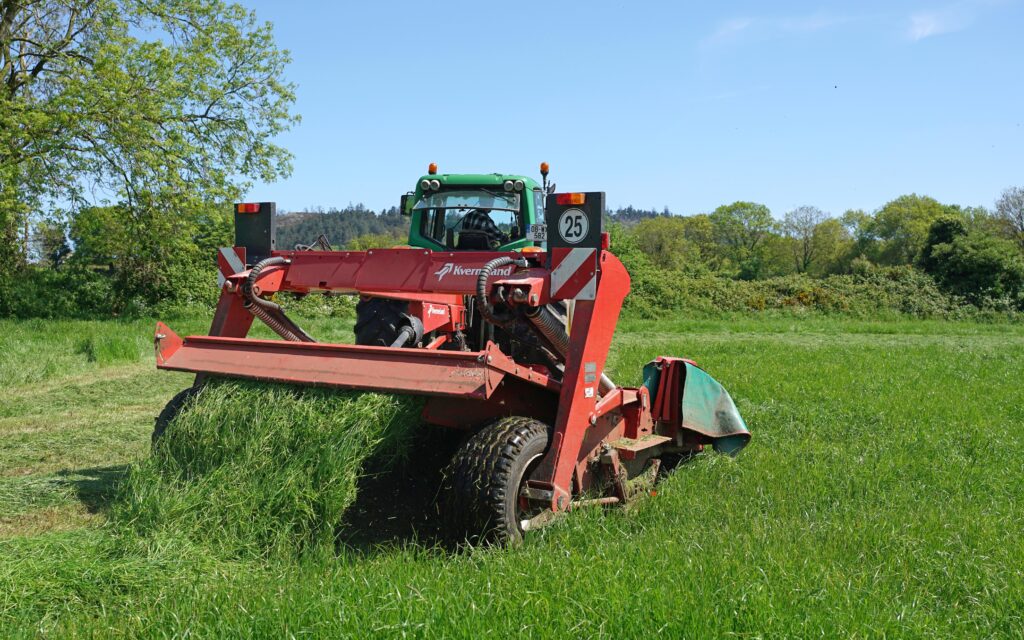The silage season is now fully underway with fields falling rapidly to the mower throughout the country as contractors such as Thomas Poole of Co. Wexford attempt to outsmart the weather and get the grass in at the optimal time.
It is a stressful time and it is not helped by the perennial stand-off between contractors and their customers over the price.
Fuel down, parts up
Last year there was a major problem with the sharp increase in fuel costs which saw significant price hikes, but some of these were covered by the higher milk price and despite some minor grumbling, there was little fuss from farming customers.

This year, Thomas said, there was the expectation that following the reduction of fuel prices, contractors’ prices would also drop back, but there have been other factors involved which have seen him have to maintain the charges at last season’s levels.
While there have been customers expecting a price decrease this year he was actually thinking of putting his rates up, but in the end he felt the easing of fuel prices was balanced by inflation elsewhere.
Silage is main operation
Thomas cuts around 1,500ac of silage a year. He does not run a large fleet of new machines but has a policy of buying older tractors and maintaining them, rather than involving himself in expensive leasing arrangements.
His main operation is mowing and chopping silage which he does with a Claas self-propelled harvester.
The tedding, raking and help with drawing the silage is undertaken by a couple of other contractors of the same scale, who tend to work together as a group rather than each run a full set-up.
Christine, his partner, is also involved with the business, helping with the paperwork, collecting parts, and most importantly of all, bringing lunch out to the team when they are at their busiest.

As the operator of the harvester, Thomas prefers to do the mowing himself as he will then have the opportunity to pick any stones that may have passed through the mower, before they get collected by the harvester.
This is not something that every driver will do, and over the years he has come to consider mowing as the most critical part of the harvesting operation as it the foundation to the whole process.
TLC for tractors
Thomas stresses that taking care of the machinery is more important than ever for even though fuel costs have eased, the price of parts most certainly has not.
As a typical example, he points out that the price of the shear bar for his harvester was €430 last season, today it is €620.
It is a lot more expensive to prepare and maintain machinery than it was, and this has to be paid for, just as the fuel does.

The equipment itself has also shot up in price. A silage trailer he purchased last year for €19,200 is now listed at €27,500 and this sort of jump is common across the board be believes.
Staffing is another issue. With the increase in machine size, price and complexity, it is no longer feasible to put a young lad up on a tractor.
The drivers need experience and such operators will have families to feed and so need to be paid, this does not come cheap, adding to the price pressure.
Keep the money and machinery rolling
Allied to the overall cost of keeping the operation running comes the problem of cashflow. Diesel tanks do not fill up by themselves and so there needs to be money coming in to pay the fuel supplier.
Thomas notes that delayed payment can be a cause of much anxiety and he strives to keep the money flowing in on time.
If it doesn’t, then the grass will not get cut. Online banking with the immediate transfer of funds is now his preferred method of payment.

With the ever tightening window for silage, Thomas believes that there needs to be more constructive communication between contractor and farmer, and while the mobile phone is a great boon in many ways, the downside is that it has become far too easy to put pressure on contractors.
From the contractor’s perspective, Thomas is adamant that being able to get the silage in on time is of greater importance than the cost of doing so.
“Timeliness is better than cheap” he maintains, and with the number of contractors hanging up the keys working together with those that keep going appears the sensible option.
